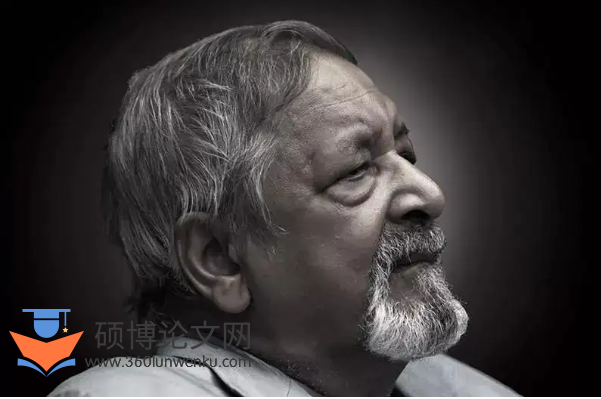本文是一篇英语论文,本文文末简要总结了文章的观点:在复杂的后殖民环境下,追求单一纯粹的文化身份是不可取的,混杂的文化身份是一种选择。
Chapter One The Crises of Absence of Identity
1.1 The Social Environment
The novel A Bend in the River was created under the background of Africa in the 20thcentury.Naipaul told the story in the first person.The narrator,the novel’s protagonist,Salim,lived on the east coast of Africa under colonial rule in the early 20th century whenEurocentrism and the racist idea dominated every aspect of this generation’s life.Therulers spread the perfect image of Europe to the colonized people.The local people livingin Africa still suffered from racialism,which led to a restricted life.The colonizersindicated that the nature of nation and identity was stable,which formed a binaryopposition between the colonizers and the colonized,between self and other,and betweenthe center of the suzerainty and the edge of the colony.They also claimed that thecolonizers were civilized,while the colonized were uncivilized,which legitimized itscolonial rule.
1.1.1 Eurocentrism
With the arrival of the Enlightenment in the 18th century,the Industrial Revolutionand the ideological Enlightenment enhanced the overall strength of European society andpromoted Europe’s self-consciousness.A series of philosophers like Montesquieu believedthat only modern Europe was a progressive modern society.In the 19th century,theIndustrial Revolution and colonial expansion provided conditions for the spread of theseideas.The theory of natural selection founded by Darwin further explained the Eurocentrictheory from the aspects of science and racial differences and confirmed his rationality.
...........................
1.2 The Family Backgrounds

英语论文怎么写
Family plays a significant role in an individual’s growth.Salim,Indar,and Ferdinandowned different family backgrounds.Commercial trade in East Africa appeared earlybefore the Western colonial invasion,and the Indians were consistent and activeparticipants in the development of commerce.They followed the influential Arabs to theeast Coast of Africa.The immigrants were mainly Muslims from the northwest of India.Salim’s ancestors were a part of them.During the colonial period,with the economydeveloping,the east coast became a suitable place to live.The famine in northwest Indiabroke out,bringing a large number of Indians to the east coast of Africa as laborers.Indar’sgrandfather came at this time.Salim and Indar were African-born Indians,but theirancestors and living methods differed significantly.Ferdinand was a native African who had never been enslaved although he was black.His family background allowed him toreceive education and become a new black different from his older generation.
...........................
Chapter Two The Attempts to Pursue Identity
2.1 Indar’s Inferior Mimicry
Bhabha(1994)said colonial mimicry was the desire of a reformed,recognized Other,as a subject that was almost the same but not quite.Mimicry is a complex,mixed andcontradictory form.On the one hand,it is a process of rejection and disobedience;On theother hand,it also appropriates and applies all beneficial things to reform,adjust andregulate oneself.Naipaul held a different idea.He thought colonial education madecolonized people feel ashamed of their origin,promoting them to aspire to the identity ofBritish.As a result,he did not recognize the disruptive power of mimicry.Indar’s mimicryof the West had different manifestations at different stages.However,he only focused onthe mimicry of the surface of the West,not getting interior power or transforming his lifethrough mimicry.Mimicry without rebellious consciousness is doomed to be futile.
2.1.1 Stage One:The Admirer of the Western Culture
Since Indar’s grandfather,his family had been living in Africa and relying on theorder established by Europeans.They had lost their connection with the traditional Indian culture.Indar received English education and was brainwashed into thinking that theycould achieve success only in European countries.He looked down upon the local Africanculture,always being indignant and supercilious because he felt unsafe and alone.Herecognized European values and imitated the British way of life.Sheng Anfeng(2011)thought that the colonized had an instinctive yearning and worship for the modernizationand authority brought by the colonial culture,and had a sense of inferiority or even disgustfor their own civilization.Indar said,“This is the nature of our stupidity andincompetence.”(Naipaul,1979:11).The culture of the host country is regarded as superiorto others and is often associated with wealth.Some things symbolizing the authority of thecolonial culture and appearing as a sign of advanced culture were regarded as miracles thatcould be illuminated by the colonial people,e.g.squash and cold tea.Indar paid attentionto his appearance and weight.His usual sport was to play squash,which was developed bythe prisoners in the London prison at the beginning of the 19th century.The prisoners hitthe wall to exercise and adjust to the atmosphere of prison life.Later,it was improved bythe descendants of the royal family in Harrow School in Britain,and then became popularamong the British people and was brought to their colonies.Indar’s break time afterplaying squash was spent drinking cold orange tea,which also originated from the British.On the surface,Indar’s lifestyle and values were deeply influenced.
.........................
2.2 Ferdinand’s Nationalism
Ferdinand was the representative of the new generation of local Africans,who hadwitnessed Africans’suffering,being confused about the colonial homeland,the superiorityof the European culture,and the hopeless future of his homeland.Ferdinand’s growing upis the epitome of the local intellectual of Africa.
2.2.1 Period One:The Blind Mimicry
When Ferdinand grew older,the bars and women were not what he focused on.“Hewas finding himself a little bit at sea”(Naipaul,1979:46).He was different from everyonein the town and did not know what he should be.He needed to find a model in life.Hestarted to imitate the people around him.He imitated the behavior of the teachers from theWest.“Mimicry reveals something in so far as it is distinct from what might be called anitself that is behind.”(Bhabha,1994:85).Ferdinand asked Salim to send him to America tostudy,because he thought he could do big business after studying abroad.America was aplace that could bring him success in his mind.Unlike the Indian immigrants Salim andIndar who once benefited from the colonial rule,Ferdinand suffered a lot from the colonial system.His mimicry of the West was just the representation of his unconscious desire togain identity when he was growing up.After experiencing the riots around him,Hegradually recognized that he was equal even superior to Salim because he was in hiscountry and could take advantage of all the sources in the country.He became the followerof“The Big Man”who built tall buildings because of imitating the West.These buildingswere just exhibitions that brought glory to“The Big Man”.Modernization could not beachieved in a short time,nor being represented by a few luxurious buildings.This was justan unrealistic scam that expressed aspirations for a better future in Africa.Ferdinand was aloyal follower of“The Big Man”.He also could not be rooted in local culture,on thecontrary,he was addicted to imitating and adhering to European culture.He followed allthings with Western style.The courses they studied were not advanced science andtechnology but blind imitation and worship of the West.The discussion in class was aparody of the West.
............................
Chapter Three The Outcome of Pursuit for Identity ................................. 32
3.1 Indar: The Outsider of the West ............................. 32
3.2 Ferdinand: The Pawn of “The Big Man” .......................... 34
3.3 Salim: The Wanderer of Culture ............................... 35
Conclusion ...................... 37
Chapter Three The Outcome of Pursuit for Identity
3.1 Indar:The Outsider of the West
Indar was a typical character who abandoned the tradition and wanted to gain westernrecognition.He was the representative of the colonized people who tried to seek identity inthe European country.His experience in Britain was incredibly similar to Naipaul’s actualexperience.They both went to the famous university and had moderate success,but theycould not assimilate into the local community.Indar looked down upon the blacks andSalim who was also the immigrant living on the coast.In front of Salim,his condescendingattitude isolated him from other people.He was always pompous when he was in contactwith others.The betrayal of the past brought him transitory happiness,also leading to hisloneliness.
On the coast,he was a young immigrant with a modern education and was aware ofthe potential danger,but he never had the idea of fighting for themselves.He did not takeany precautions to pursue political status.In fact,the Indian groups were an importantgroup on the coast that engaged in commercial activity and owned a reputation.“They hadbecome merchant bankers in an unofficial way,staking small prospecting companies,staking trading ventures to India and Arabia and the Persian Gulf”(Naipaul,1979:17).Itwas possible to construct the sphere of influence of the immigrant.However,Indarunquestioningly worshiped the European values,eager to be a part of the power,not itself.

英语论文参考
............................
ConclusionIn
A Bend in the River,readers can feel Naipaul’s concern for the history and currentsituation of third-world countries.Naipaul attaches great importance to the exchange andintegration of national cultures,at the same time,as an immigrant writer,he focusesidentity issue in his work.In A Bend in the River,he expresses that belonging to a puresingle culture is impossible.Building a hybridity identity is the best option.
Bhabha’s experience is similar to Naipaul’s in that they are both Indians who havelived in the West for a long time.They are unable to fully integrate into the West or returnto their native land spiritually.There are similarities and differences in their attitudestoward identity pursuit,which can be seen in A Bend in the River.
In A Bend in the River,Indar lived on the coast of Africa with an English educationsince childhood,and his family could settle down and accumulate wealth because of thecolonial rule.He had a beautiful fantasy about Britain.In the new era,he hoped theWestern culture could help him escape his identity crisis.Entirely mimicking the Westernculture could not help him solve his problems.He was reduced to the outsider of the West.Bhabha thought the colonized copied or appropriated the colonizers’culture,customs,andvalues.Through this process,the colonized became a subject almost the same,but notquite.This similarity and difference threatened the authority of the colonial discourse andeffectively deconstructed the binary opposition between the colonizer and the colonized.However,Indar did not want to break this binary opposition.He wanted to be a part of theupper,which was impossible to be accepted by the Westerners.Ferdinand,a native ofAfrica,was briefly attracted to Western culture in his adolescence and embraced thenational culture.However,at this time,the national culture had become extreme andbecame a tool of the dictatorship of“The Big Man”.As a member of the ruling machine,he was aware of the situation but could not change it.He had to be in a state of despair.Salim is the narrator,and he came into contact with people of all cultures but he had nourgency to get close to one side or the other.
reference(omitted)
